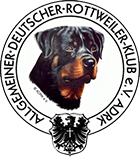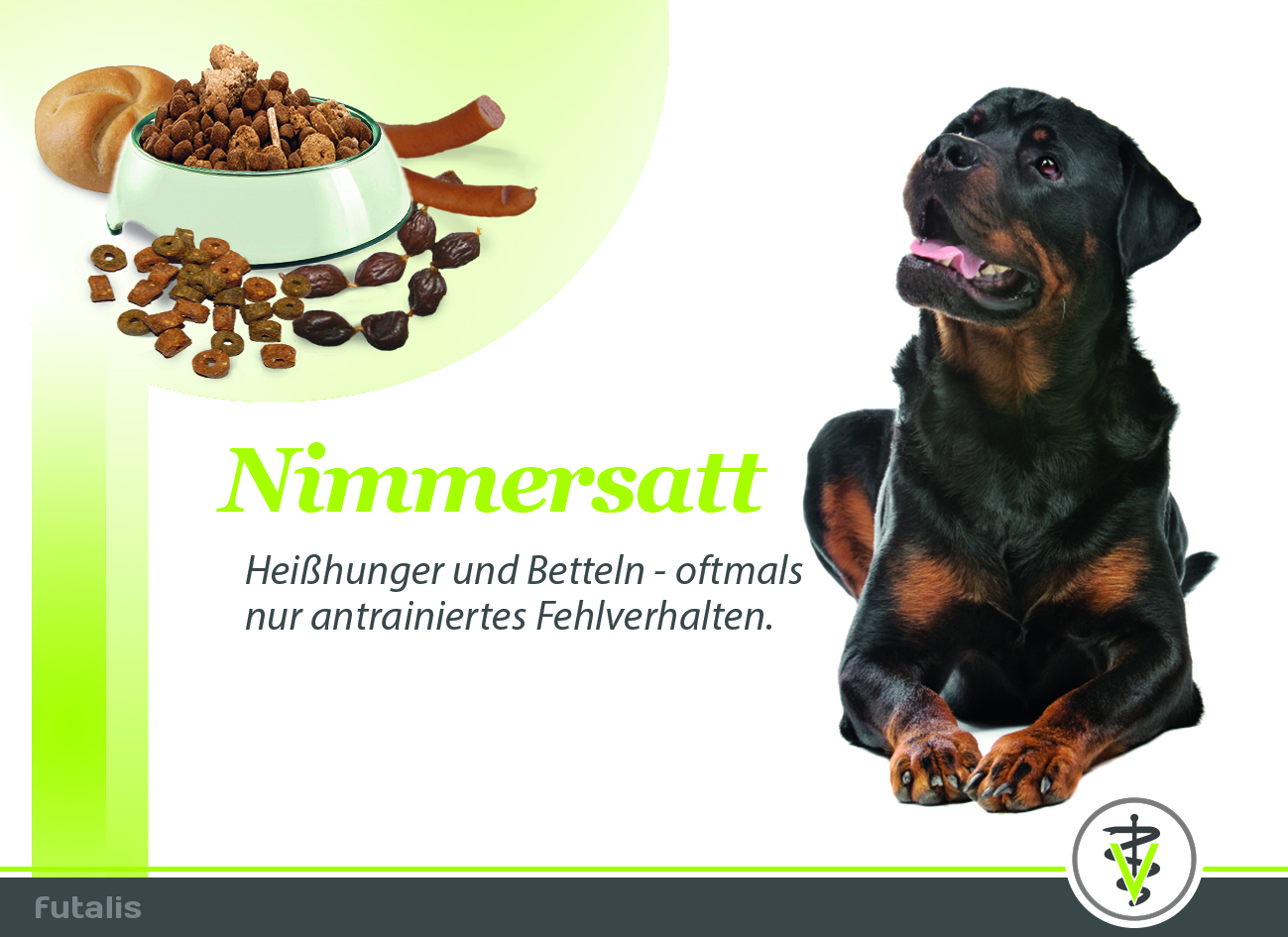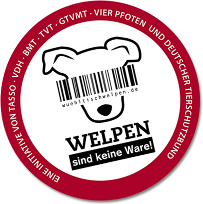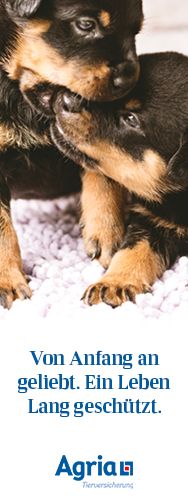| ADRK |
| Allgemeiner Deutscher Rottweiler-Klub e.V. |
Insatiable - why some dogs (apparently) constantly feel hungry
Surely each of you knows a very voracious dog who is constantly looking for something to eat, begging his owners for food, clearing the table in an unobserved minute and even does not stop at garbage cans. Pitiful creatures who are always hungry, aren't they? But are these dogs really always hungry? Or is there perhaps something else behind it?
Hunger is not just appetite
The body feels hunger when an energy or nutrient deficiency situation occurs. The intake of food thus averts a deficiency-induced danger to the body. The situation is different with appetite. This is purely psychologically controlled and does not originate from any real deficiency situation. The brain has only stored the information that the intake of food causes a positive body feeling, and requires it in certain situations.
Why does my Rottweiler beg me for food?
Dogs that beg seek the closeness of their owner, nudge him with their nose or paw, whine or bark, perhaps. With some dogs, begging also expresses itself more quietly through waiting under the dining table or the infamous dog's gaze. But here caution is required: Often the intended goal of the dog is pure interpretation thing.
Real hunger is hardly to be expected between meals for dogs that are fed at least twice a day. Begging can result from many other reasons, such as the search for attention, boredom or simply from habit - such as the owner's coat bag always filled with treats or the well-intentioned plugging in of treats by the neighbor. Here again the appetite plays a big role, which was often trained unconsciously.
Most dogs react very strongly to food stimuli. The urge to get enough food and to build up reserves for bad times is innate. Therefore, dogs that receive food in response to the above signals react much more joyfully than dogs that are occupied with other means. The owner then of course assumes that it is real hunger that has caused his dog to beg. In return, the dog will work more intensively on its owner the next time in order to receive the expected food. Especially castrated dogs show an increased appetite due to the hormonal changes, which is even increased by "success experiences", i.e. the actual receipt of food.
Giving in to begging can have health consequences
Dogs that are often given treats between meals are often oversupplied with energy. Hidden energy sources, such as chewing bones, also contribute to the energy supply, but are often not considered at all. An oversupply of energy leads in most cases to overweight. However, this is not to be regarded as a "beauty defect", but as a serious illness. Being overweight promotes the development of other problems such as joint diseases, metabolic disorders or skin diseases and reduces your dog's life expectancy.
In addition, treats or food leftovers from the table can also cause missupplies with certain nutrients. Treats are only supplementary feeds and do not have a balanced composition. Bones contain a lot of calcium and excessive feeding leads to an oversupply of minerals. Sausage is very strongly seasoned and fatty and can cause intolerances. Some foods are even toxic to dogs, such as onions, chocolate or grapes.
Consistency from the start
In order to prevent begging from the outset, you can start raising as soon as your new puppy comes into the house. Right from the start, be careful not to fix him too much on food. There is food with meals, and in between only in certain, fixed situations - for example as a reward for completed training units. Feeding is always best at fixed times, so the dog has security in his daily routine and knows when food is available and that begging in between is not worthwhile. Avoid giving your dog food at every opportunity and avoid situations in which your dog expects food from you as much as possible. For example, do not feed your dog from the table. In the pack of wolves, subordinate wolves only eat when the leading wolves are full. Of course, it is not necessary to "avert" your dog's food completely, otherwise you can also attract a bad eater. He should take his food both from the bowl and from your hand.
By selecting a proper food, you can prevent the development of overweight right from the start. This is particularly useful as it is much more strenuous to get rid of the excess pounds afterwards. The food should correspond exactly to the energy and nutrient content of your dog with its individual characteristics. The amount of food given on the basis of these criteria should be weighed and exactly adhered to on a daily basis. All additional feeds, including treats or chewing bones, must not simply be administered additionally, but are included in the daily ration if possible. Weigh your dog regularly and react if his ideal weight is exceeded by adjusting the food. Depending on the circumstances, a reduction in the amount of food may be sufficient or a change in the composition of the food may be necessary to continue to meet your dog's need for vitamins and minerals. The decision about this can be made after a professional ration calculation for your dog, which for example university institutes for animal nutrition or specialized animals carry out.
How do I stop begging my dog?
Once you have learned how to behave, you will find it difficult to train down again. If the unwanted behaviour has already taken up large parts of everyday life, targeted behaviour training can be useful. Many dog schools offer specialized help here. However, it is often sufficient to use a few tricks to steer the dog's food instinct in the right direction. If you divide the daily ration into 2 to 3 meals, the phases between the meals will be shortened and your dog will not develop any real hunger. Let your dog work out his food in a playful way by packing it in cardboard boxes or tubes. You can then hide these in ever new places in the apartment or on the walk. You can also use part of the food instead of energy-rich treats to feed your dog during the walk as a reward for the tasks he has completed. This increases his activity, thus increasing energy consumption and strengthening the bond between you and your dog.
And the most important thing is: Stay consistent! Your dog's feeding instinct is natural, but the constant availability of food is unnatural! Do not give in to your dog's begging, but feed him only when he shows the desired behaviour. If your dog learns that his begging is unsuccessful, he will limit his behaviour over time. Inform relatives and neighbours about the dangers of secretly infecting tidbits and make sure that this is contained. However, there are real "vacuum cleaners" among the dogs who find the most impossible ways to get food. Only extreme care and avoidance of opportunities to steal can help here.
If your dog is already clearly overweight, the composition of the food must also be adapted. It is no longer sufficient to reduce the amount of food - this would be frustrating for dog and owner and can also endanger a sufficient supply of vitamins and minerals. Rather, a feed with a reduced energy content should be used, which is made possible by a reduced fat content and an increased crude fibre content. This improves your dog's feeling of fullness despite reduced energy intake. The content of vitamins and minerals in the food must also be adapted to the individual needs of your dog. In addition to the suitable feed composition, special attention must be paid to the daily adherence to the required feed quantity and to the calculation of all additional feeds.
Excluding disease-related causes
In some cases, a dog's voraciousness may also be caused by a disease. If there are digestive disorders such as an underactive pancreas or a parasite infestation in the intestine, this can lead to an increased appetite, but the animals do not become overweight but rather lose weight. The situation is different with metabolic diseases, which disturb the hormonal balance of the body: Diabetes mellitus (diabetes), hypothyroidism (hypothyroidism) or Cushing's disease (hyperactivity of the adrenal cortex) often lead to an increased appetite with weight gain. This may also involve other processes that lead to changes in the body's stature, such as the loss of muscle mass or the development of edema (water retention). If your dog's appetite suddenly increases, if his greed for food cannot be contained by education, or if other symptoms are added, you should always consult your vet.
Also certain drugs, for example drugs against epilepsy or cortisone-like preparations, lead to an increase in appetite and/or fat build-up. However, it is particularly important in dogs that have a predisposition to obesity due to illness or medication not to give in to the dog's urge for food. Especially when other diseases are already present, overweight should be avoided in order not to complicate the underlying disease. Instead, a suitable feed with reduced energy content should be selected. Here, too, an adequate distraction programme can work wonders










